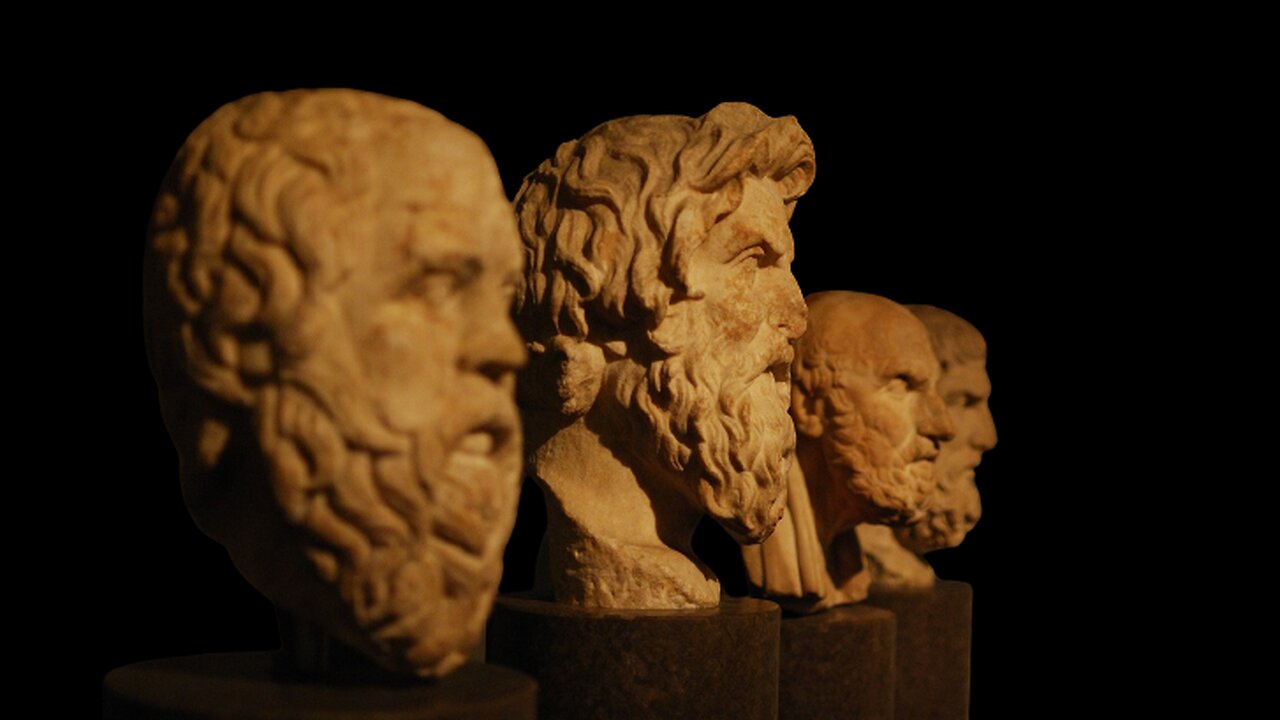Premium Only Content

20 Aristotle's (Philosophers) thoughts on various aspects of life
Aristotle (384–322 BC) was one of the most influential philosophers and scholars in the history of the Western world. Born in Stagira, Greece, he was a student of Plato and later became the tutor of Alexander the Great.
Aristotle's Works:
Natural Sciences: Aristotle made significant contributions to biology, physics, and astronomy. He described various species of animals and studied their anatomy, behavior, and reproduction. His works in natural sciences included observations and classifications that paved the way for future scientific inquiries.
Metaphysics: Aristotle’s metaphysical thought included a detailed examination of the nature of reality. He distinguished between form and matter and introduced the concept of "substance," referring to individual existing things.
Ethics: Aristotle's ethical philosophy is well articulated in his works such as the "Nicomachean Ethics." He introduced the concept of eudaimonia, often translated as "happiness" or "flourishing." Aristotle believed that happiness is achieved by living a life of virtue, which is a mean between deficiency and excess.
Politics: Aristotle also wrote extensively on the topics of governance and statesmanship. He believed in a constitutional government and analyzed different types of governments, exploring their strengths and weaknesses.
Logic: He is credited with developing the field of logic as a formal discipline. His syllogistic logic laid the groundwork for deductive reasoning, which remains integral to the philosophical and scientific inquiry today.
Poetics: Aristotle studied and wrote about the art of poetry and drama. He analyzed tragic and epic forms of poetry and introduced concepts like the tragic flaw, catharsis, and mimesis, which are still discussed in the studies of literature and drama.
Aristotle's Views on Life:
Purpose and Potential: Aristotle believed that everything in nature has a purpose (or "telos"). He thought that realizing one’s potential and fulfilling one’s purpose is key to living a good life.
Virtue Ethics: He proposed that moral virtue is a state of character concerned with choice. It involves maintaining a balanced life, avoiding extremes, and choosing the mean between excess and deficiency (the Golden Mean).
Rationality: Aristotle considered rationality as the defining characteristic of humans. He thought that exercising rationality and intellect is essential for achieving virtue and happiness.
Social Beings: He also viewed humans as social beings, emphasizing the importance of the community and social relationships in achieving a fulfilling life.
Aristotle's extensive writings and observations have continued to shape philosophy, natural science, theology, and many other fields for centuries, showcasing the enduring significance of his insights and perspectives.
-
 UPCOMING
UPCOMING
Michael Franzese
22 minutes agoThe Hidden Connection behind the Wave of Attacks EXPOSED
-

The Quartering
2 hours agoClintons To Testify, Zoo Asks For Peoples Pets For Food, Young Voters, GTA To Require ID To Play
66.9K12 -
 LIVE
LIVE
Barry Cunningham
4 hours agoREACTING TO THE PRESIDENT TRUMP INTERVIEW ON CNBC! (THE CONTRAST OF COMMUNISM AND MORE NEWS))
3,767 watching -
 LIVE
LIVE
StoneMountain64
2 hours agoBATTLEFIELD 6 BETA Training and Prepping
403 watching -
 1:15:15
1:15:15
Awaken With JP
2 hours agoArrest Warrants for Dems, MSNBC Sucks, and More - LIES Ep 103
12.8K10 -
 UPCOMING
UPCOMING
The HotSeat
8 minutes agoIf I Were The Devil: Part I
1 -
 UPCOMING
UPCOMING
The Tom Renz Show
40 minutes agoBurn Bags - Epstein Story is Back On Top (No Pun Intended)
13 -
![[Ep 721] DOJ: Grand Jury on Russiagate | Rogue TX Dems - FAFO | Sam Anthony – [your]NEWS](https://1a-1791.com/video/fww1/39/s8/1/u/i/K/8/uiK8y.0kob.1-small-Ep-721-DOJ-Grand-Jury-on-Ru.jpg) UPCOMING
UPCOMING
The Nunn Report - w/ Dan Nunn
52 minutes ago[Ep 721] DOJ: Grand Jury on Russiagate | Rogue TX Dems - FAFO | Sam Anthony – [your]NEWS
12 -
 1:58:54
1:58:54
The Charlie Kirk Show
3 hours agoThe Obamagate Grand Jury + The Mamdani/Warren Alliance | Prof. Steele, Brand | 8.5.2025
53.4K25 -
 1:20:03
1:20:03
Sean Unpaved
3 hours agoNFL Coaching Edge: Top Staffs, Rookie Head Coaches, & NFC South Breakdown
23.5K